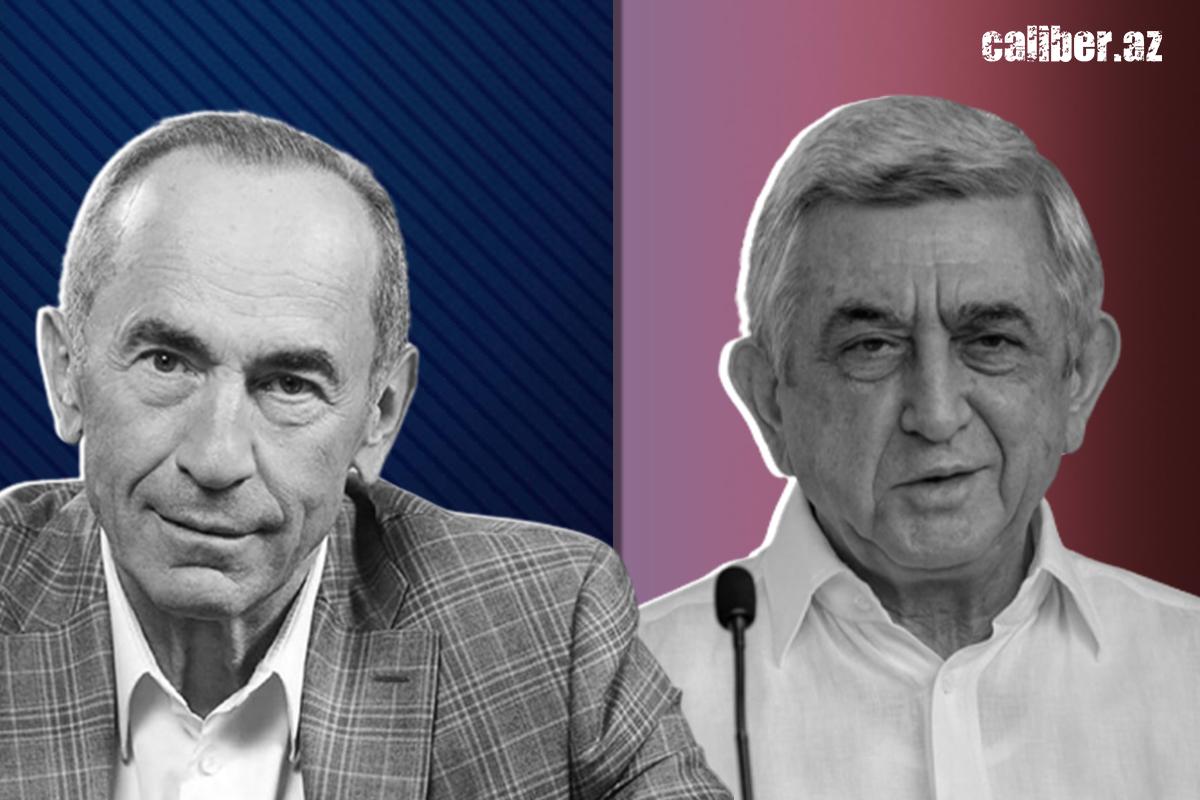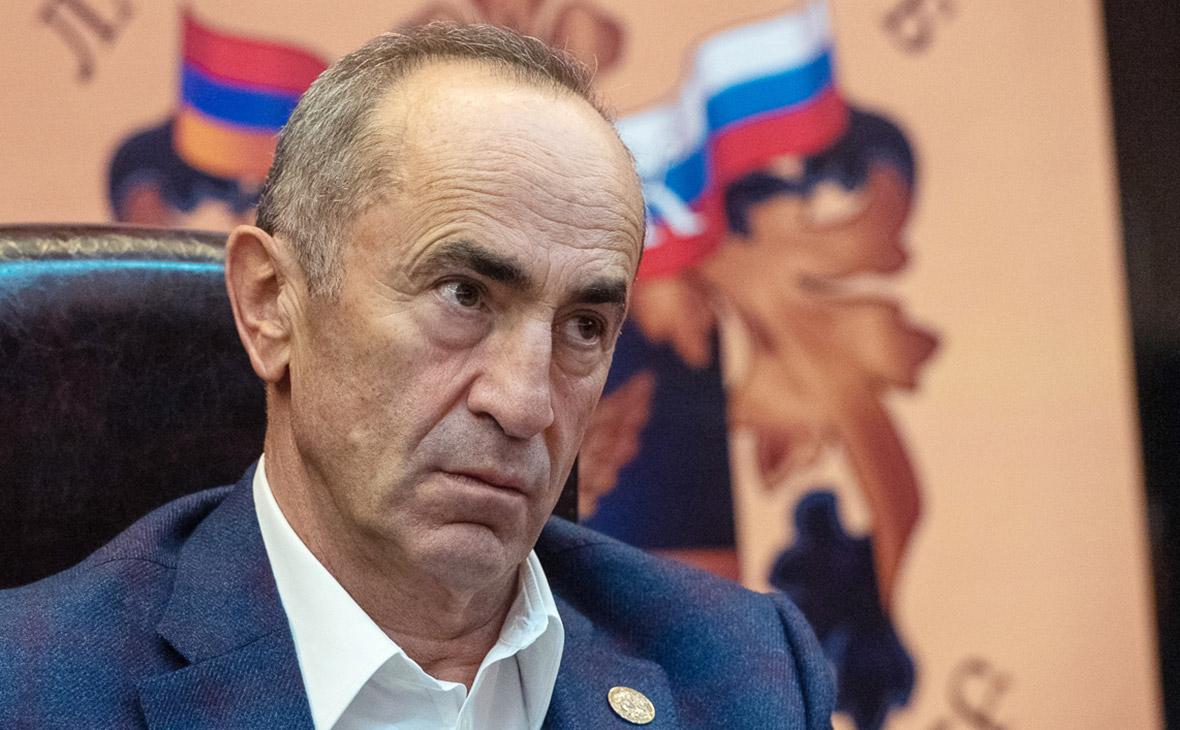Old guard resists peace in South Caucasus Kocharyan challenges Pashinyan again
One of the leaders of the Karabakh clan and a staunch advocate of revanchism — Armenia’s former president Robert Kocharyan — has once again resurfaced in Armenian politics with a series of inflammatory statements. At a press conference in Yerevan, this ideologue of the notion of “genetic incompatibility between Armenians and Azerbaijanis” launched a sharp attack on the current Armenian government, questioning the effectiveness of Washington-brokered agreements and, more broadly, the pro-Western course of Nikol Pashinyan’s administration.
Kocharyan and his allies, including former president Serzh Sargsyan, reacted strongly against the Washington Declaration immediately after it was signed, which aimed to establish peace in the region.

Alarmed by these developments, Kocharyan and his circle denounced the Washington agreements as a “dangerous document, signed under pressure from Azerbaijani aggression, unilateral demands, and geopolitical processes.” It was widely expected that Armenian revanchist propagandists would continue efforts to push for regime change, using provocative rhetoric to sway public opinion.
At the October 7 press conference, Kocharyan argued that “by signing the Washington agreements, Armenia gained not a single advantage, and Nikol Pashinyan personally contributed to this outcome.”
“What did the parties gain from the documents signed on 8 August in Washington? First, the U.S. obtained concrete control over the corridor to be established in the future; second, the ability to effectively monitor the Armenia–Iran border; and third, the possibility of nominating the Armenian president for a Nobel Prize. Azerbaijan gained the right to a corridor through Armenian territory, the dissolution of the Minsk Group, and the repeal of the 907th amendment. And what did Armenia get? Nothing. Only problems,” he said, blaming Armenia’s current authorities for the outcome.
“And what did Nikol Pashinyan get? A picture with President Trump’s signature and a paper with no legal force, which allows him to deceive the Armenian people again,” Kocharyan added, turning public attention to domestic issues in Armenia.
In particular, he criticised the Armenian leadership’s decision to reduce the country’s military budget, calling it an irresponsible step that does not serve Armenia’s interests or strengthen its security: “In this situation, Azerbaijan is increasing its military budget, while Armenia is cutting theirs. I have no explanation. One can only speculate. Perhaps it is because Aliyev has stated several times that he will not allow the militarisation of Armenia.”
The comparison that the Armenian political dilettante attempted to draw between Armenia and Azerbaijan on defence matters evokes nothing but sarcasm, as Baku’s and Yerevan’s military capabilities are completely incomparable. Even Armenian authorities acknowledge this fact. In September of this year, Armenian Parliament Speaker Alen Simonyan clearly stated: “For objective reasons, Armenia cannot compete in military spending with either Azerbaijan or Türkiye, which has the second-largest army in NATO. The key issue here is the effective use of available resources.”
Thus, Robert Kocharyan’s provocative statements are nothing more than a clear indicator of revanchist ambitions and a call for a new war with Azerbaijan.
Furthermore, among Kocharyan’s long list of absurd claims, his rejection of U.S. policy in the South Caucasus deserves special attention. According to him, the United States has no economic interests in the region, and Armenia could supposedly construct the “Trump Road” on its own.
“What interest do the U.S. have? Simply none economically. One option is to propose expanding the project. A second option is to thank the U.S., say that the idea is good, but we will build the section ourselves. The name can remain ‘Trump Road,’ but control will remain with Armenia,” Kocharyan declared, even suggesting how Armenia could finance the construction of the “Trump Road.”
“There is a railway, but no rails or sleepers. The RA reserve fund is 65 billion. Spread it over a couple of years, give up bonuses, no need to take a loan. Isn’t it shameful? To create risks, tell fairy tales about a ‘1 billion’ programme, when it is possible to build the road in 2–3 years,” the ex-president mused.
Kocharyan’s absurd speculations about constructing the Armenian section of the Zangezur corridor at Yerevan’s expense reveal his complete lack of understanding of current realities, as well as his incompetence as a politician with vastly inflated ambitions.
On the other hand, it is almost comical to hear “wise” advice on saving state funds from a well-known corrupt official who shamelessly plundered his own people throughout his time in power. Clearly, the would-be patriot has overlooked a crucial fact: Armenians still vividly remember how poorly they lived during those dark times when the dishonourable leaders of the Karabakh clan were at the helm of the state.

As we can see, even though none of the opposition’s attempts to overthrow Armenia’s current government have succeeded, Kocharyan is still nursing the idea of returning to power. On this path, he clearly counts on support from Russia. It is no coincidence that he has repeatedly urged Armenians to deepen relations with Moscow, claiming that Russia is the only guarantor of Armenia’s security.
As a staunch promoter of Russian interests, he has also repeatedly stated that the republic should continue cooperating with the Collective Security Treaty Organisation (CSTO) rather than orienting itself toward the West. Interestingly, Kocharyan even links Armenia’s defeat in the Second Karabakh War to Yerevan’s drift away from Russia. In February of this year, he claimed that the Prague statement, under which Armenia recognised Karabakh as part of Azerbaijan, nullified Russia’s mediating role. In other words, in his view, it was Armenia’s disregard for Russian interests in the region that led to the “loss of Karabakh.”
At the press conference on October 7, Kocharyan announced that his team intends to participate in the upcoming parliamentary elections, signalling that he plans to use every available lever of influence — including leaning on Moscow. However, given that Armenian society is unlikely to support a return to the past, the chances of the Karabakh clan leaders regaining power in Armenia are effectively zero. Furthermore, following the parliamentary elections and the upcoming constitutional referendum, both Kocharyan and Sargsyan could potentially face legal consequences and find themselves in the defendants’ dock.








